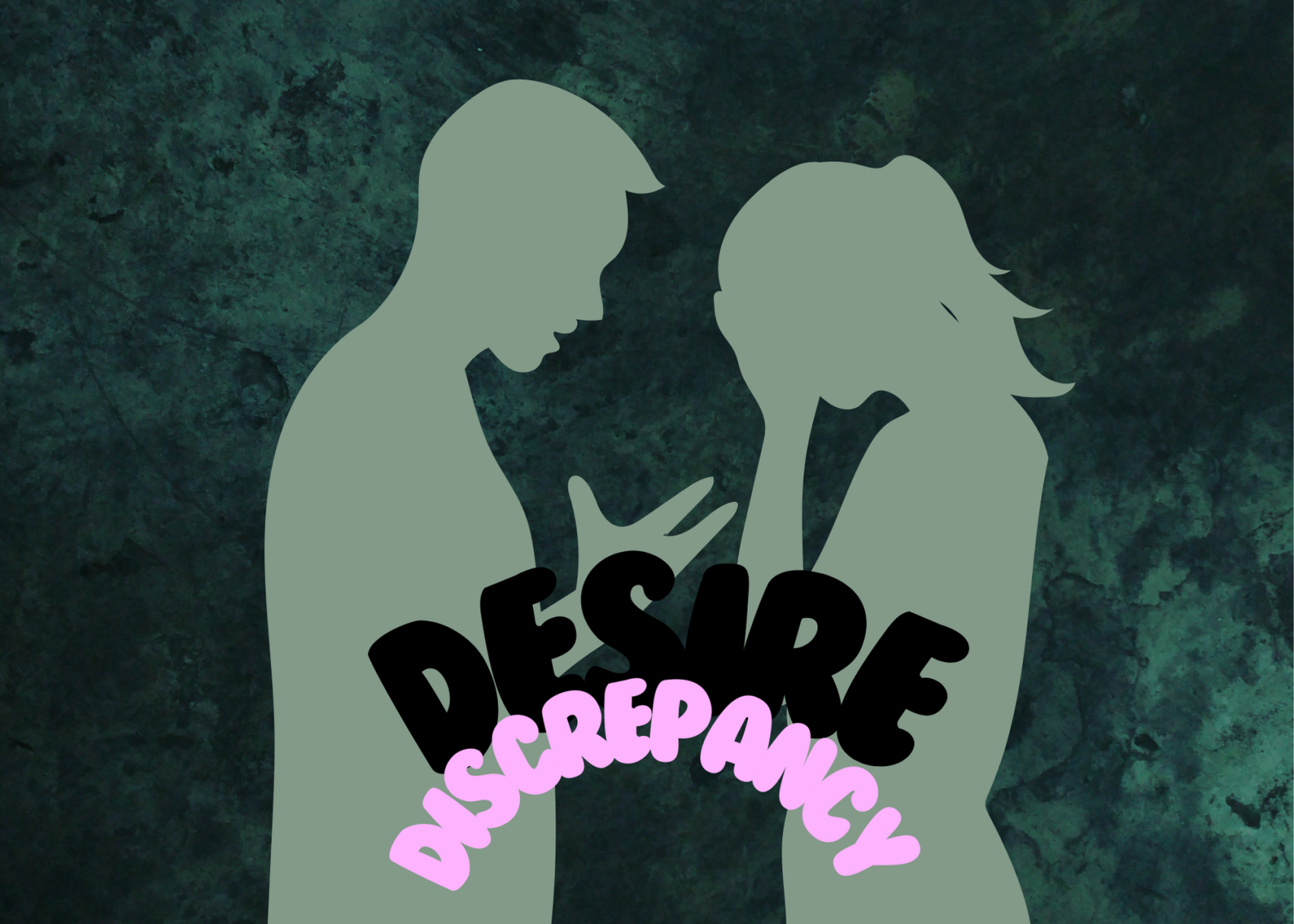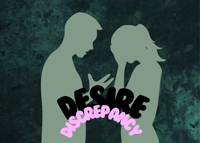Sexual desire can be a powerful force that deepens connection and intimacy. But what happens when one partner's sexual desires don't align with the other's? This is known as sexual desire discrepancy, or SDD, a common issue that can impact relationship dynamics, leading to frustration, resentment, and emotional distance. SDD can occur in both heterosexual and LGBTQ+ couples. However, it doesn't have to be a deal-breaker; instead, it can be an opportunity for deeper understanding and growth.
According to the International Society for Sexual Medicine, “Libido can be impacted by hormonal imbalances, certain medications, chronic medical conditions, and/or psychological factors,” so it’s essential to consult a doctor to determine if there are any physical conditions affecting sexual desire.
Dr. Shannon Chavez, Licensed Psychologist and Certified Sex Therapist, explains that SDD can also be caused by sexual disconnection. Early on, relationships are full of energy and anticipation, but over time, couples fall into routines. Sex can shift from being a source of joy and connection to a routine or an obligation.
Unmet expectations and resentment
In many relationships, traditional concepts about sex can create a complex web of expectations and misunderstandings. Some men might perceive a lack of sexual engagement from their partner as a personal rejection, leading to feelings of resentment. This stems from a belief that sexual intimacy is the primary way a partner expresses affection and interest.
Conversely, women are frequently taught that sex is an obligation, a duty they must fulfill in their relationships, explained Dr. Chavez. This sense of duty can create internal conflict, as women might feel compelled to engage in sex even when they don’t want to, leading to shame and bitterness. This creates a cycle of unspoken expectations and emotions on both sides, where societal messages distort the couple’s understanding of love, communication, and personal boundaries.
“Something I think within our [Latino] community that's really important too is the unspoken truths about experiences of sexual abuse and sexual boundary crossings, […] things like intimate partner violence and sexual abuse within the family. That has a huge role in our discrepancies around sexual desire. Not only just how it connects our nervous system, but also our perception of sex [as] a dangerous thing,” said Chavez. Drawing from her experience working with over 50 cases, she emphasizes how these traumas are often left unaddressed across generations, creating a cycle of silence and pain.
Rejection can often feel deeply personal, Dr. Chavez said, as though it is a direct dismissal. However, many times, the cause of rejection might not be the person at all, but rather the sexual initiation process itself. When someone rejects intimacy or connection, it may not reflect their feelings towards their partner but rather indicate that they are grappling with their own emotional or mental state.
This issue can lead to a series of misinterpretations. For instance, a person might jump to conclusions, assuming that their partner's lack of interest signals problems such as a loss of attraction or even infidelity. In response, they may adopt a "problem-solver" mindset.
This approach can backfire. Instead of resolving the issue, these assumptions can create additional distance. When one partner starts demanding the other what they need to do, it can build walls around intimacy, making the problem even harder to address. According to Dr. Chavez, effective resolution requires open communication and empathy rather than jumping to conclusions.
“Every single person will go through a period of low desire in their life. It's not an abnormal thing. So, normalizing it for yourself first usually gives you a sense of how you want to take care of it,” said Dr. Chavez.
Recognizing one's needs within the realm of sexuality is another important factor to consider. Unmet needs can be a major barrier to sexual desire. An individual might assume their partner isn’t putting in enough effort or is always looking to upset them. Often, these assumptions come from unaddressed needs or emotions that they haven’t clearly communicated. Unhealed wounds can lead to hurt that spill over their intimate lives, leaving sex as a casualty.
Dr Chavez also explains how, in the Latino community, individuals often hear things that hint at deeply ingrained expectations around gender roles, particularly when it comes to intimacy. An auntie makes a joke or a casual remark, but underneath it, there’s an unspoken understanding: for many women, providing sex can feel like an obligation, a duty tied to their role as a wife. In family dynamics, there's a noticeable power imbalance, where men are often validated for their sexual desires.
She describes how many times it is seen as normal for men to want more sex, while women who don’t match that desire often carry guilt. Many feel inadequate, as though being unable to fulfill this role makes them incomplete. For them, sex becomes more of a service, a task they provide, creating resentment over the lack of acknowledgment of their own needs and feelings in the relationship.
Reintroducing play in the relationship
Dr. Chavez explains that sexual intimacy thrives in a playful, present mindset when a person is fully engaged in the moment. This playful mindset is ideal for connecting with their partner, but when that headspace is not achieved, the focus can drift to anticipating what's to come, creating an anxious mindset. “We have so much messaging around sexual connection, about gratifying the other person, and all of [the] things [that] have to happen, the orgasm. It's just so much pressure. There's no play. It becomes [a] job, and we feel like we're either failing or succeeding at that job,” she said.
A playful mindset, even in non-sexual activities, helps couples bond, creating a sense of safety and freedom. When partners engage in a shared activity that allows them to be themselves while connecting with each other, they cultivate the same sense of trust and openness that leads to fulfilling sexual intimacy.
How to address SDD
“Sexual connection is really a moment-by-moment experience. It's not about what you're doing. It's about the experience you're creating,” explained Chavez.
When it comes to tackling desire issues in a relationship, she explains that it’s crucial to start with oneself before diving into joint efforts. It's essential to first tackle what's happening on an individual level—consider past traumas, mental and physical health, or even just one’s personal connection to sexuality. Ignoring these aspects can make it much harder to work through issues as a couple.
Communication is another key factor to consider. The goal should be to listen with the intent to understand rather than react. This approach furthers empathy and allows couples to work together toward solutions without placing blame or responsibility solely on one partner. By agreeing to disagree, they can navigate their differences in a more constructive way.
“Messy communication is ok,” said Dr Chavez. She endorses that it’s a normal part of any relationship and can actually help couples dig deeper into what they're really feeling. For her, it’s in those messy moments where their true thoughts, vulnerability, and real needs come out. Eventually, they’ll find that things smooth out as they figure out what really matters.
Improving eroticism
“First, we just have to think about sex,” said Dr. Chavez. She suggests that individuals must reflect on their ideal sexual situation —maybe it’s fantasy-driven, or perhaps it’s a thrilling adventure in a location that pushes the boundaries of the ordinary. It can be challenging for couples to explore these desires openly, she explains, and there might be hesitation about sharing them. But that vulnerability and honesty are crucial. It can help them uncover what truly excites them and how they might bring those fantasies to life, opening creative pathways for sexual experiences.
Mutual masturbation is another piece of advice from Dr. Chavez. Involving either self-stimulation in the presence of a partner or guiding your partner's stimulation, this practice offers valuable insights into each other's sensuality and pleasure. Observing one’s partner during mutual masturbation helps them understand their personal preferences and touch, cultivating a deeper connection and reducing pressure to "perform." This exercise, often surrounded by shame, can be a powerful way to embrace and express sexuality for couples. By removing shame and focusing on full-body pleasure, they encourage vulnerability and openness and enrich the understanding of each other's desires and pleasure.
In the context of the play, Dr. Chavez proposes that couples give themselves permission to dress up—whether for a costume party, a holiday or simply to engage in something a bit different—it can ignite significant libidinal energy. This isn’t just about dressing provocatively but about incorporating elements that break away from the usual. For instance, putting on a wig or choosing an outfit that diverges from everyday wear can boost one’s self-esteem and create a shift in mindset, enhancing sexual desire and energy.
She also shared how, in her clinical practice, she’s witnessed the impact of dance classes on her patients. This activity becomes a transformative journey, empowering individuals to reconnect with their bodies and embrace their sensuality. Through dance, some patients have found a renewed sense of confidence and a deeper understanding of who they are.
Establishing habits around sexual connection should be a healthy priority. “We are constantly developing habits in our life that actually improve our mental health and… physical health, but we don't do that for sexual health. We assume that sexual health is on this island all on its own and that it doesn't need the same efforts that we put into every other aspect of our life,” said Dr. Chavez. Habits like regular intimacy check-ins and planned time for non-sexual connection can play a massive role in the couple’s sexual health long term.
Normalizing sexual desire discrepancy (SDD) is crucial for helping couples shift the conversation from viewing it as a problem to understanding it as a natural part of their sexual life. This approach enables them to find constructive ways to address it, rather than just feeling like they need to solve an issue.











(0) comments
Welcome to the discussion.
Log In
Keep it Clean. Please avoid obscene, vulgar, lewd, racist or sexually-oriented language.
PLEASE TURN OFF YOUR CAPS LOCK.
Don't Threaten. Threats of harming another person will not be tolerated.
Be Truthful. Don't knowingly lie about anyone or anything.
Be Nice. No racism, sexism or any sort of -ism that is degrading to another person.
Be Proactive. Use the 'Report' link on each comment to let us know of abusive posts.
Share with Us. We'd love to hear eyewitness accounts, the history behind an article.